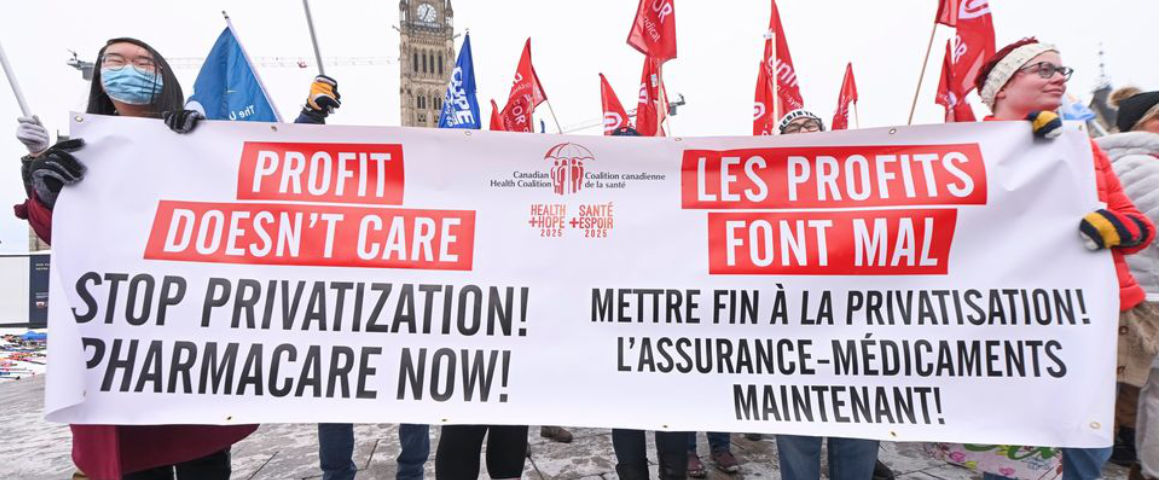By Dave McKee
The December 14 announcement that the Liberals and NDP have extended the deadline for implementing a pharmacare program is enormously frustrating for the millions of people in Canada who have insufficient or no drug coverage.
Of all the countries in the world with a universal healthcare system, Canada remains the only one without universal pharmacare. An estimated 7.5 million people who urgently need the benefit will now have to wait until March 2024 to even see legislation tabled, let alone get implemented.
The delay is hardly surprising, though, as huge health corporations and right-wing politicians and media have spent months undermining the government’s commitment to pharmacare. The biggest argument they use is that real pharmacare – meaning a universal, single-payer drug insurance plan – is impossibly expensive. The Parliamentary Budget Officer reported in October that, compared to current public expenditures on drugs, such a program would cost an additional $11.2 billion in 2024-25 and $13.4 billion in 2027-28.
The response from corporate Canada to this report has been virtually gleeful, with a barrage of headlines warning that universal pharmacare is an unsustainable burden (and, by extension, that their profiteering lock on the estimated $83 billion industry is well-protected).
In the face of such corporate pressure, which has been building since long before the PBO report was released, the government has quickly moved to limit the proposed program to a small group of the most vulnerable population and a limited range of pharmaceuticals. Specifically, people who have some form of private coverage or whose income is above a certain level will be excluded from the plan. And while the NDP talks about universal, single-payer pharmacare, it seems distressingly prepared to accept the Liberals’ rollbacks.
But at that point, we aren’t actually talking about universal pharmacare any longer, are we? Instead, we’re looking at some form of two-tier system which concretizes private pharmaceutical care – that’s the roughly 55 percent of the population who will continue to pay for drug coverage through private plans (either workplace or individual or both), plus a huge number of people who have insufficient coverage but whose incomes are deemed to be enough to pay for drugs out-of-pocket – and provides a vastly limited level of public care to a small percentage of people.
Without question, there are many people who desperately need even this limited degree of pharmacare. And it is shameful that they will be made to wait even longer as Ottawa spends the next three months (at least) in figuring out how it can introduce a plan that doesn’t alter its pro-corporate budget priorities or threaten private profit.
But a two-tier, multi-payer system is not only insufficient; it’s a threat to healthcare in general. For if we allow one section of healthcare – and pharmacare is a huge section – to include private plans as the central feature, how long can we expect to wait until there is pressure to allow private care in already established areas of healthcare?
Well, we don’t have to wait very long – the pressure is already building. The Globe and Mail posed this exact question on December 15, just one day after the government announced its extension in pharmacare legislation. “As long as everyone gets essential care,” opines Globe health columnist André Picard, “it matters not who pays the bill – a public insurer, a private insurer, the employer or the individual.”
Really? It matters not that individuals may – and do – pay huge bills for necessary drugs instead of having a public plan that can provide such necessities in a universal, accessible and democratic manner?
What Picard is really saying is that the greed of private corporations trumps the needs of the people. And against this, labour and healthcare advocates need to argue that need, in fact, trumps greed. We need to use the next three months to press for a stronger program.
Between now and March, the Liberals and especially the NDP need to be reminded that working people need and expect nothing less than a full universal, single-payer pharmacare program. No two-tiers, no limited range of drugs, no means testing.
And when it comes to the financial pushback, the Liberals and NDP need to be reminded that the PBO’s own cost estimate for a full pharmacare program is only about one-third of Canada’s bloated military budget.
To win this, we need a mass campaign that mobilizes millions of people in a short period of time. This can be done – we’ve seen it many times, including the current mass mobilizations against the genocide in Gaza. But we need the labour in particular to put its shoulder to the wheel, stop parroting the timid concessionary line of the federal NDP, and start organizing on behalf of the entire working class in this country.
Expanded Medicare can be won, but only with a fight. Without a fight, Medicare itself will be plundered.
[Photo: Canada Health Coalition]
Support socialist media!
If you found this article useful, please consider donating to People’s Voice or purchasing a subscription so that you get every issue of Canada’s leading socialist publication delivered to your door or inbox!
For over 100 years, we have been 100% reader-supported, with no corporate or government funding.




